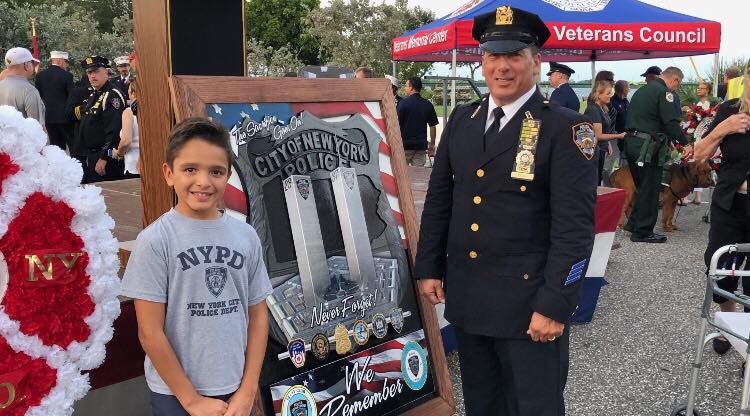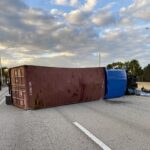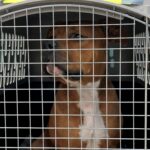
Retired detective Enrique ‘Rick’ Colon recalled listening for screams as he and thousands of other first responders searched through billowing smoke and rubble to find any survivors after the Twin Towers collapsed Sept. 11, 2001, in New York City.
“I thought we were going to find and help people,” 54-year-old Colon said. “In reality, everything was dust. Everything was obliterated. There was nothing there.”
Colon, then a detective with New York Police Department, recalled being summoned to Ground Zero about a half hour after the second World Trade Center tower fell. Even though the initial report did not state ‘terrorist attack,’ Colon said it was clear at the time the events that day were no accident.
“It was so obvious,” Colon said. “Two planes don’t hit the World Trade Center a half hour apart.”
Colon was off duty when he along with every other police officer, firefighter and emergency medical technician in New York City were ordered to report to their command stations immediately.
“We sifted through debris to find any bones we could match with DNA,” Colon said. “There were thousands of cops. If someone thought they heard something, everyone turned quiet.”
Wednesday marked 18 years since 19 terrorists hijacked four U.S. commercial airplanes and used them as weapons, killing nearly 3,000 people.
The morning of Sept. 11, 2001, the members of Al-Qaeda, an Islamist extremist network, crashed the planes into the World Trade Center, the Pentagon in Washington D.C. and a field near Shanksville, Pennsylvania. Millions watched live on television and across New York City as the towers burned and then fell into a cloud of burning rubble.
Colon, who now lives in Palm Bay, was honored Wednesday at a Patriots Day Remembrance event held in Sebastian for his search and rescue efforts after the attacks. Colon recovered the body of New York Port Authority Officer George Howard, who had rushed into the World Trade Center to try and rescue those trapped inside.
Howard was dead at the scene, Colon said.
Howard’s mother gave George W. Bush, who was president at the time, her son’s badge. A couple weeks after the attacks, Bush made his presidential address to the nation where he mentioned Howard and raised his badge, Colon said.
Search and rescue
A battlefield.
That’s how Colon remembers the aftermath of the deadly attacks on Sept. 11, 2001 that shook the nation.
“You felt like you were at war,” Colon said. “Ground zero was considered a crime scene.”
Colon, who started with NYPD in 1986, said he and other detectives went back and forth to Ground Zero every day from September 2001 to February 2002. First responders were given papers masks as they combed the city of New York to search for any survivors.
“There were hundreds of people with pictures, saying, ‘Could you please find my loved one?'” Colon said. “In your heart, you know they’re gone. We knew there was nobody left.”
The grey smoke that blanketed the city caused officers and firefighters to look like mummies, Colon said. Firefighters and cops shed tears after learning their co-workers and friends were in the Twin Towers when they collapsed.
“They were ordered to go into the building,” Colon said. “They didn’t have a chance.”
Colon said cops from across the country drove to ground zero to help search for survivors. Colon and other officials worked 16 to 20 hour days sifting through the rubble.
Colon said officials loaded dump trucks with debris and took it to a landfill.
9/11 takes toll on first responders years later
Colon lost several friends either during the terrorist attacks or afterwards from 9-11 related illnesses including cancer. Most of his cop friends have recently died.
More than 400 emergency workers died in the attacks, including firefighters, cops, patrolmen and emergency medical technicians. Colon breathed in toxins during his search and rescue mission, causing him to have respiratory issues years later.
Colon said he suffers from multiple sclerosis, a disease where the immune system eats away at the protective covering of nerves. Colon said his illness started five years ago with a headache.
Now, Colon said he has 58 lesions in his brain and is on several medications. Colon, who retired in 2006, said he can’t sleep much now because of headaches.
Death of Osama bin Laden
Colon moved from New York to Sebastian in 2006. Colon then moved to Palm Bay in 2010.
The retired detective reflected on the death of Al-Qaeda leader Osama bin Laden, the mastermind behind the Sept. 11 attacks. Bin Laden was killed in 2011 in Pakistan by U.S. Navy Seals.
Colon did not rejoice in terrorist leader’s death, but rather said he was glad Bin Laden “paid his dues to the world for his crimes.” Colon hopes the nation never forgets the tragedy of what happened on Sept. 11, 2001.
“Nobody was prepared for that,” he said.






